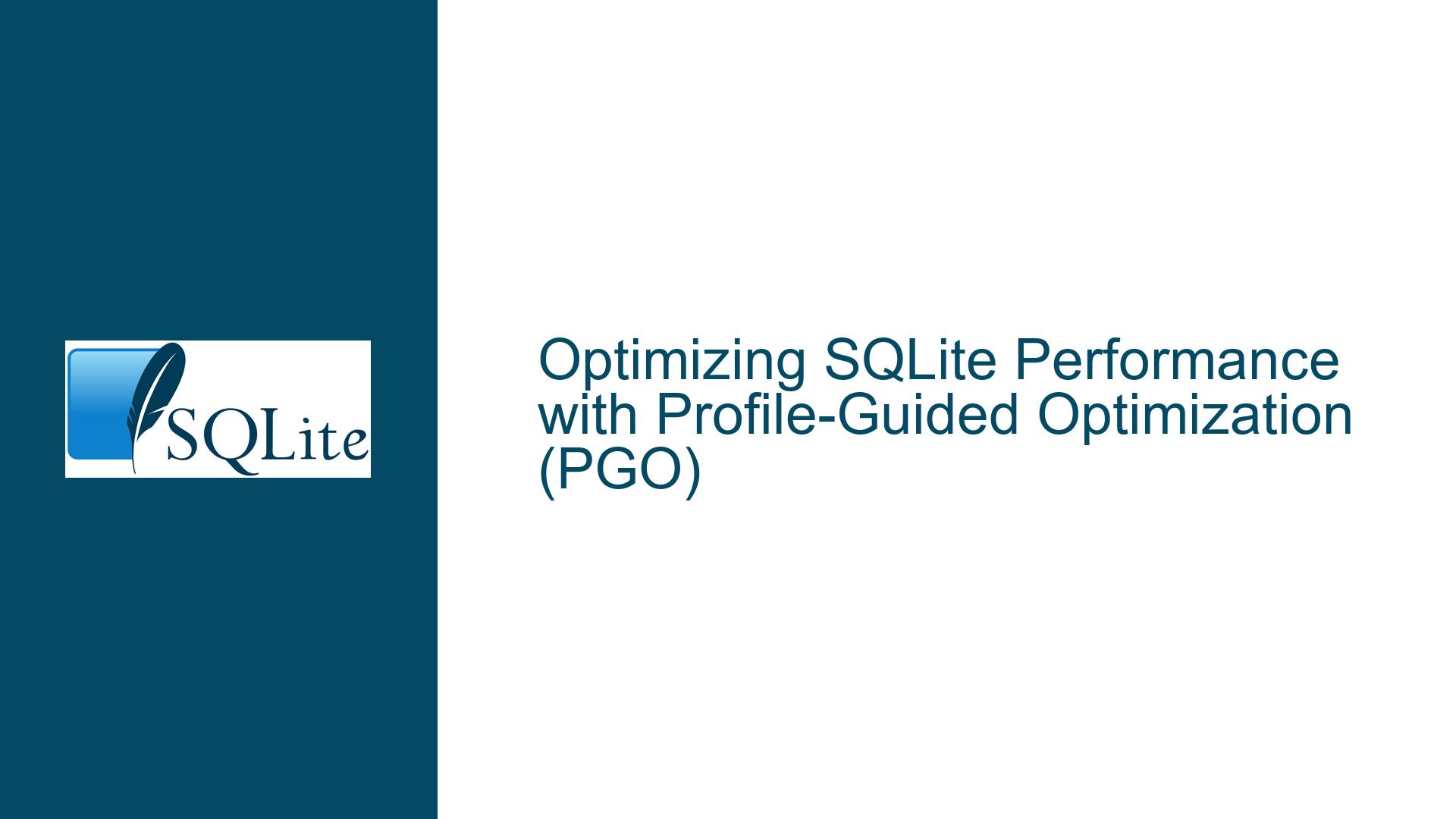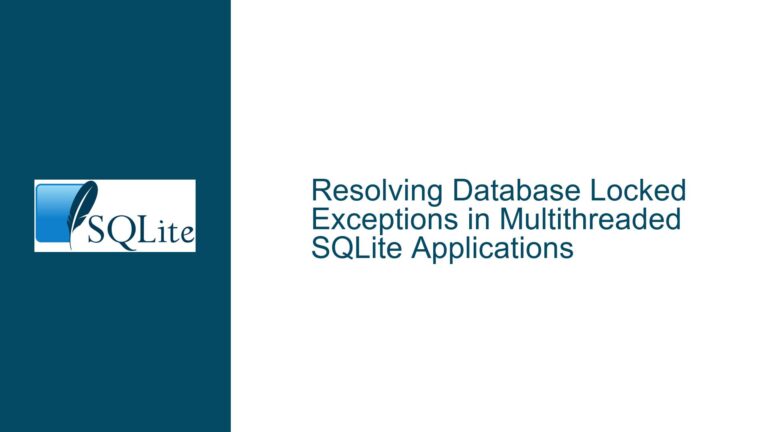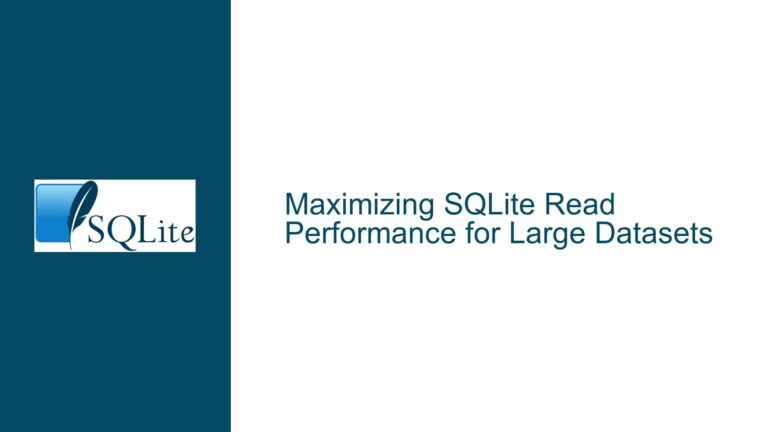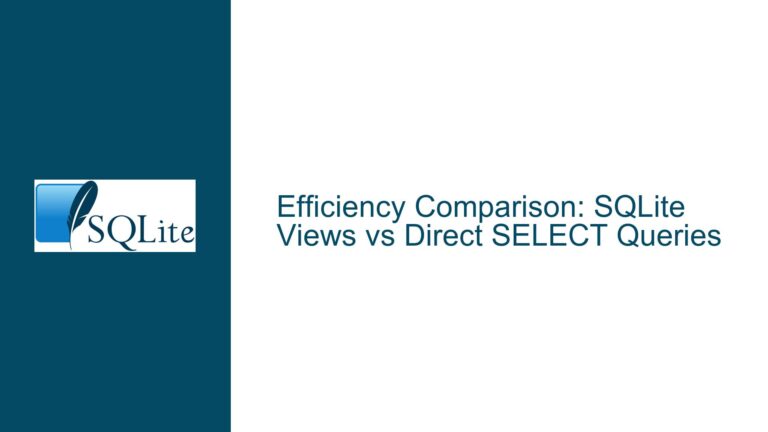Optimizing SQLite Performance with Profile-Guided Optimization (PGO)
Understanding Profile-Guided Optimization (PGO) and Its Impact on SQLite Performance
Profile-Guided Optimization (PGO) is a compiler optimization technique that leverages runtime profiling data to improve the performance of compiled code. In the context of SQLite, PGO can be used to fine-tune the database engine for specific workloads, resulting in measurable performance gains. The core idea behind PGO is to collect data about how the application behaves during execution and then use this data to guide the compiler in making more informed optimization decisions. This approach is particularly effective for databases like SQLite, where performance can vary significantly depending on the workload and usage patterns.
SQLite, being a lightweight, embedded database, is often used in scenarios where performance is critical. While SQLite is already highly optimized, PGO offers an additional layer of optimization that can yield significant improvements in specific use cases. For example, PGO can help optimize query execution plans, reduce latency in transaction processing, and improve the efficiency of memory usage. These optimizations are achieved by tailoring the compiled binary to the specific patterns observed during profiling, such as frequently executed queries, common data access patterns, and typical transaction sizes.
The benefits of PGO are not universal and depend heavily on the workload. In some benchmarks, PGO has been shown to improve SQLite performance by up to 10-15%, particularly in scenarios involving complex queries or high concurrency. However, the actual performance gains can vary depending on factors such as the compiler used, the profiling methodology, and the specific workload characteristics. This makes PGO a powerful but nuanced tool for optimizing SQLite performance.
Challenges and Considerations When Implementing PGO for SQLite
While PGO offers compelling performance benefits, implementing it for SQLite is not without challenges. One of the primary challenges is the need for representative workload data. Profiling SQLite with PGO requires running the database under conditions that closely mimic its real-world usage. This means collecting data from a wide range of queries, transactions, and concurrency scenarios. Without representative profiling data, the optimizations applied by PGO may not align with the actual workload, potentially leading to suboptimal performance or even performance degradation.
Another consideration is the complexity of the PGO process itself. Unlike traditional compilation, PGO involves multiple steps: instrumenting the code to collect profiling data, running the instrumented code to generate the profile, and then recompiling the code using the profile data. Each of these steps requires careful configuration and execution, and any errors or misconfigurations can compromise the effectiveness of the optimization. Additionally, the PGO process can be time-consuming, particularly for large codebases like SQLite, which may require extensive profiling to capture all relevant behavior.
Compatibility with different compilers and platforms is another potential hurdle. While many modern compilers, such as GCC and Clang, support PGO, the specific implementation details and capabilities can vary. For example, some compilers may offer more advanced PGO features, such as feedback-directed optimization or cross-module optimization, while others may have limitations or require additional configuration. Ensuring that PGO is correctly implemented across all supported platforms and compilers can be a significant undertaking.
Finally, there is the question of maintainability. PGO-optimized binaries are tailored to specific workloads, which means they may not perform as well under different conditions. This can create challenges when deploying SQLite in environments with varying or unpredictable workloads. Additionally, maintaining PGO-optimized builds alongside standard builds can increase the complexity of the build and release process, particularly for projects that support multiple platforms or configurations.
Step-by-Step Guide to Implementing and Validating PGO for SQLite
To implement PGO for SQLite, follow these steps:
Instrument the SQLite Code for Profiling: The first step is to compile SQLite with instrumentation enabled. This involves modifying the build configuration to include the appropriate compiler flags. For example, with GCC, you would use the
-fprofile-generateflag to enable profiling instrumentation. This flag instructs the compiler to insert additional code into the binary to collect runtime data.Run Representative Workloads: Once the instrumented binary is built, the next step is to run it under conditions that closely mimic the intended workload. This could involve executing a suite of benchmark queries, simulating concurrent transactions, or running a real-world application that uses SQLite. The goal is to collect profiling data that accurately reflects the database’s behavior in its target environment.
Generate the Profile Data: After running the workload, the instrumented binary will generate a profile data file (e.g.,
.gcdafiles for GCC). This file contains information about the execution paths, function call frequencies, and other runtime metrics that the compiler can use to guide optimization.Recompile SQLite with the Profile Data: The final step is to recompile SQLite using the collected profile data. This is done by passing the
-fprofile-useflag to the compiler, along with the path to the profile data file. The compiler will use this data to optimize the binary for the observed workload, potentially improving performance in key areas.Validate the Optimized Binary: After recompiling, it is essential to validate the optimized binary to ensure that the PGO process has not introduced any regressions or unexpected behavior. This involves running the same workload again and comparing the performance metrics against the original, non-optimized binary. Pay particular attention to areas where performance improvements were expected, as well as any potential trade-offs or side effects.
Iterate and Refine: PGO is an iterative process, and it may take several cycles of profiling, recompiling, and validation to achieve the desired performance improvements. If the initial results are not satisfactory, consider refining the workload or adjusting the profiling methodology to capture more representative data.
By following these steps, you can effectively leverage PGO to optimize SQLite for your specific use case. However, it is important to approach PGO with a clear understanding of its limitations and trade-offs. While PGO can yield significant performance improvements, it is not a silver bullet and should be used as part of a broader optimization strategy that includes query tuning, indexing, and other best practices for database performance.
In conclusion, Profile-Guided Optimization (PGO) is a powerful tool for optimizing SQLite performance, particularly in scenarios where the workload is well-defined and representative profiling data is available. By understanding the principles of PGO, addressing its challenges, and following a structured implementation process, you can unlock significant performance gains for your SQLite-based applications. However, it is crucial to approach PGO with care, ensuring that the optimizations align with your specific workload and usage patterns. With the right approach, PGO can be a valuable addition to your SQLite optimization toolkit.






